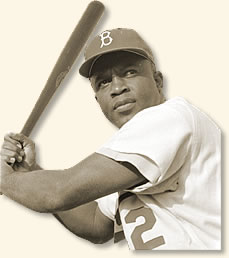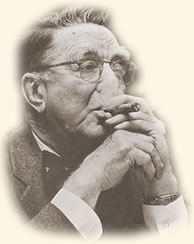It has always been my opinion that if the President was a little more Jackie Robinson -- maybe a little more Martin Luther King -- then he would have been eminently more successful than he has been.
The following story illustrates what I mean:
from eyewitnesshistory.com:
Jackie Robinson Breaks Baseball's Color Barrier, 1945:
The meeting took place in Rickey's office on August 28, 1945 and lasted about three hours. Rickey grilled the twenty-six year old Robinson on his resolve and challenged him with racist scenarios that he may have to confront on and off the field. Satisfied with his response, Rickey assigned Robinson to the Montreal Royals - a Dodger farm team - for the 1946 season. Robinson was moved up to the Dodgers at the beginning of the 1947 season.
"Can you do it? Can you do it?"
.............
'There's more here than just playing, Jackie,' Rickey warned. 'I wish it meant only hits, runs and errors-things you can see in a box score. . . .'
...'Can you do it? Can you do it?' Rickey asked over and over.
Shifting nervously, Robinson looked from Rickey to Sukeforth as they talked of his arms and legs and swing and courage. Did he have the guts to play the game no matter what happened? Rickey pointed out the enormity of the responsibility for all concerned: owners of the club, Rickey, Robinson and all baseball. The opposition would shout insults, come in spikes first, throw at his head.
'Mr. Rickey,' Robinson said, 'they've been throwing at my head for a long time.'Rickey's voice rose. 'Suppose I'm a player. . . in the heat of an important ball game.' He drew back as if to charge at Robinson. 'Suppose I collide with you at second base. When I get up, I yell, 'You dirty, black son of a -' 'He finished the castigation and added calmly, 'What do you do?'
Robinson blinked. He licked his lips and swallowed.'Mr. Rickey,' he murmured, 'do you want a ballplayer who's afraid to fight back?'
'I want a ballplayer with guts enough not to fight back!' Rickey exclaimed almost savagely. He paced across the floor and returned with finger pointing. 'You've got to do this job with base hits and stolen bases and fielding ground balls, Jackie. Nothing else!'
He moved behind his big desk again and faced the cornered Robinson. He posed as a cynical clerk in a southern hotel who not only refused him a room, but cursed him as he did so. What would Robinson do? He posed as a prejudiced sportswriter, ordered to turn in a twisted story, full of bias and racial animosity. How would Robinson answer the sportswriter? He ordered the player from imaginary dining rooms. He jostled him in imaginary hotel lobbies, railroad stations. What would Robinson do?
Branch Rickey
'Now I'm playing against you in a World Series!" Rickey stormed and removed his jacket for greater freedom. Robinson's hands clenched, trembled from the rising tension. "I'm a hotheaded player. I want to win that game, so I go into you spikes first, but you don't give ground. You stand there and you jab the ball into my ribs and the umpire yells, 'Out!' I flare up - all I see is your face-that black face right on top of me -'Rickey's bespectacled face, glistening with sweat, was inches from Robinson's at this point. He yelled into the motionless mask, 'So I haul off and punch you right in the cheek!'
An oversized fist swung through the air and barely missed Robinson's face. He blinked, but his head didn't move.
'What do you do?' Rickey roared.
'Mr. Rickey,' he whispered, 'I've got two cheeks. That it?'"
'via Blog this'
The President is always abused.
If he isn't, he isn't doing anything.
~ Harry S. Truman
We heard so much about how this man -- this man pictured below -- stood between Barack and success. This man works in the Senate where he was out-numbered and out-gunned by Harry Reid and the Democrats. Plus he doesn't look like he could win a fight with a hummingbird.
I just don't think BHO had it in his make-up, in his personality. But if he did, things would have been significantly different IMO. He would have been the transformational President his backers dreamed he would be.
He did not and likely still does not realize the truth of Truman's quote above and the fact that he was the living embodiment of MLK's I Have a Dream speech -- that he would be judged not on the color of his skin, but on the content of his character.
And he just could never summon the kind of strength and intestinal fortitude that true heroes of the march to justice had -- heroes like MLK and Jackie Robinson.
And that's too bad, because instead of what we have today -- we could have something more resembling this result:
from the New York Times:
Two Men Who Did the Right Thing - New York Times:
"The monument was representative of a time in history, beyond baseball, that in the late 1940's reached to the deepest, the most tragic, and yet the most elevating moments of a nation in racial crisis. Robinson, a black man, was breaking the long-held racial barrier in the major leagues. Reese, from Louisville, Ky., had inherited a teammate whom many people did not want to see play major league baseball."
The statue captures a significant moment that is much remembered, although the precise details surrounding it are hazy. With Robinson receiving death threats and heckling and taunts from the crowd in a ballpark on the road, Pee Wee Reese walked over to him on the infield at a point either before or during a game and offered a quiet but significant gesture of friendship and comradeship.
"My father had done his own soul searching," said Mark Reese, Pee Wee's son, "and he knew that some fans, teammates, and yes, some family members didn't want him to play with a black man.
"But," Mark Reese added, "my father listened to his heart, and not to the chorus."
He added that his father admired Robinson as a ballplayer and as a man. When a petition was passed around in spring training by some Dodger players saying they would refuse to play with Robinson, Reese declined to sign it. And when the moment came for him to demonstrate his concern for a teammate, in the most subtle but unmistakable fashion, he took it.
The statue shows the two players, with Reese's arm around Robinson's shoulder. There is no photograph of the moment. It is not totally certain if Reese, the shortstop, put his hand on Robinson's shoulder, or his arm around him, or just moved up close to him.
'via Blog this'


No comments:
Post a Comment